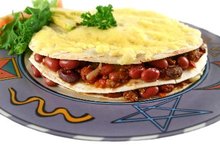Nutritional Information on Semolina Flour
Semolina flour is typically used to make pasta, but you can also use it to make breads and pizza crust. This type of flour is made from ground durum wheat, and is typically more yellow in color than all-purpose flour. Because semolina flour is made from wheat, you should avoid it if you have Celiac disease, gluten intolerance or wheat allergies.
Calories and Fat
A 0.25 cup serving of semolina flour contains 140 calories. These calories are composed of approximately 80 percent carbohydrates, 15 percent protein and 5 percent fat. Semolina flour is low in fat, with only .5 grams per serving. One serving of flour contains no saturated fat, cholesterol or trans fat.
Protein
The Nutritional Content of Cassava Flour
Learn More
Semolina flour is higher in protein than white flour, with 5 grams per serving as opposed to 3.2 grams. The Dietary Guidelines for Americans suggests women consume 46 grams of protein per day and men consume 56 grams. The 5 grams of protein in each serving of semolina flour provides about 10 percent of this amount for both groups.
Carbohydrates and Fiber
The majority of the calories in each serving of semolina flour come from carbohydrates. Each serving contains 30 grams of carbohydrates, most of which are starch, a complex carbohydrate. Semolina flour does contain a small amount of fiber, another complex carbohydrate. Each serving contains 1 gram of fiber, which provides 4 percent of the daily value. Fiber assists with digestion and can help you avoid constipation. Semolina flour is low in the simple carbohydrate, sugar with only 1 gram per serving.
Sodium
Tapioca Flour Nutrition
Learn More
Semolina flour is low in sodium, with only 1 gram per serving. This provides less than 1 percent of the maximum recommended daily intake, which is 2,300 milligrams for healthy individuals and 1,500 for those with heart or kidney disease. The Dietary Guidelines for Americans also suggests that adults over 50 and African-Americans consume less than 1,500 milligrams per day.
Iron
One serving of semolina flour provides 8 percent of the daily value for iron. Iron is essential because it helps you form hemoglobin, which delivers oxygen to your cells. Iron deficiency can lead to fatigue and a weak immune system. Non-meat sources of iron, such as semolina flour, are not as easily absorbed as meat sources of iron. You can increase the absorption of iron in semolina flour by consuming it with vitamin C or a meat source of iron such as a red sauce made with lean ground beef or pizza with pepperoni.
Related Articles
References
Writer Bio
Lisa Thompson has been writing since 2008, when she began writing for the Prevention website. She is a holistic health practitioner, nationally certified massage therapist and National Council on Strength and Fitness-certified personal trainer. Thompson also holds certificates in nutrition and herbology from the Natural Healing Institute, as well as a Master of Education from California State University.









